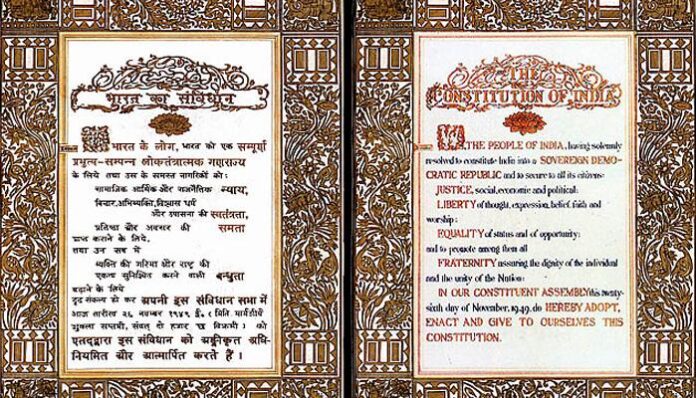Article 44 under the Directive Principles of State Policy of the Constitution provides ample scope and priority to ensure uniform civil laws for all religions in a timely manner. When the Constitution explicitly mentions this, what impediment is there in implementing it?

Niraj Krishna
I am having difficulty personally understanding why any religion should be given this vast, expansive jurisdiction. In such a scenario, religion will intervene in every aspect of life and restrain the legislature from encroachment in that domain. What freedom do we have? Our social structure is filled with inequality, discrimination, and other things. This freedom is given to us so that we can rectify the disparities where there is opposition to our fundamental rights in this social system. – Dr. Ambedkar
The Uniform Civil Code is a law related to social matters that is uniformly applicable to all people of all religions in matters such as marriage, divorce, maintenance, inheritance, and adoption. In other words, the fundamental idea of the ‘Uniform Civil Code’ is that there should be no separate civil laws for different religions or sects. It is above all the private laws of any religion or caste. In 1930, Jawaharlal Nehru, although he supported a Uniform Civil Code, had to face opposition from senior leaders.
Currently, the Uniform Civil Code is a proposal in India to create and implement a uniform law for citizens that will be uniformly applicable to all citizens without discrimination based on their religion, gender, and sexual preferences. Currently, personal laws for different communities are governed by their religious scriptures. Implementing a Uniform Civil Code throughout the country is one of the contentious debates initiated by the ruling BJP in India.
This is an important issue in Indian politics regarding secularism, and it has become controversial in the protection of Sharia and religious customs by India’s political left, Muslim groups, and other conservative religious groups and communities. Individual laws are different from public laws. In between, Articles 25-28 of the Indian Constitution guarantee religious freedom to Indian citizens and allow religious groups to manage their own affairs. Article 44 of the Constitution expects Indian states to apply state policies and a uniform law for all Indian citizens when formulating national policies.
Before delving into the comprehension of Article 44 of the Constitution, it is essential to understand the purpose behind its introduction. Mahatma Gandhi, in an article titled “The Only Way,” published in his newspaper ‘Harijan’ on November 19, 1939, wrote, “The Constitution Assembly alone can create a constitution that completely interprets the nation’s inherent nature and fulfills the popular will in the true sense.” He declared, “The Constitution Assembly is the only way to achieve a just solution to religious and other issues.” To fulfill this purpose, the Constitution Assembly was formed after gaining independence, and on August 29, 1947, Dr. Ambedkar was appointed as the Chairman of the Drafting Committee to prepare the draft of the Constitution.
The framers of our Constitution engaged in extensive debate on the necessity of a Uniform Civil Code, but due to the inability to reach a consensus on a single opinion, it was incorporated into the directive principles with the expectation that the state, meaning the Indian government, would move forward in implementing it. Instead of progressing in this direction, the then Prime Minister Jawaharlal Nehru, in 1955, introduced the Hindu Code Bill. Under this bill, the customs and rituals related to marriage and succession rights of Hindus, Sikhs, and Buddhists were codified. Although several Hindu organizations and leaders argued that it would break up united Hindu families and was not feasible to grant women equal rights as men, Nehru remained firm in his intentions. Unfortunately, Nehru lacked the courage to take a similar stance on the Uniform Civil Code, primarily due to appeasing minority communities, especially Muslims.
The mention of the Uniform Civil Code is found in Article 44 of Part IV of the Indian Constitution. It instructs us to strive towards implementing a Uniform Civil Code. The Supreme Court has also repeatedly sought the views of the central government on the implementation of the Uniform Civil Code. The term ‘secularism’ was introduced into the preamble of the Indian Constitution through the 42nd Amendment, emphasizing that the aim of the Indian Constitution is to eliminate any discrimination based on religious grounds among all citizens. However, due to the non-implementation of the Uniform Civil Code to date, a significant section of the population in India is still deprived of their rights due to religious laws.
The concept of ‘Rule of Law’ is inherent in fundamental rights, which stipulates that there should be equal laws for all citizens. However, even after so many years of independence, a significant section of the population is still struggling for their fundamental rights. In this way, the non-implementation of equal citizenship rights can be seen as a violation not only of the rule of law and the constitution but also as an injustice to culture and society in the name of ‘social culture’. This is because every culture and civilization grants equal rights to women and men under its fundamental principles, but over time, these principles are often misrepresented, leading to inequality.
Article 44 under the Directive Principles of State Policy of the Constitution provides ample scope and priority to ensure uniform civil laws for all religions in a timely manner. When the Constitution explicitly mentions this, what impediment is there in implementing it? On one hand, where the constitution emphasizes secularism in its provisions, on the other hand, the mention of equal citizenship rights somewhere can be considered an essential dimension to address religious impartiality. When the country adheres to equal laws for other aspects, why not individual laws for all citizens? This question not only challenges the mind but also raises questions about India’s constitution.
The Law Commission has advocated for the implementation of equal citizenship rights. It also states that personal laws cannot discriminate, nor can they violate the rights of equality. It cannot be inhumane either. Therefore, it is the government’s duty to pass laws in Parliament for this purpose. Former Chief Justice of the Supreme Court, Gajendra Gadkar, said in his statement as the Chairman of the Law Commission, “Not implementing Article 44 is a failure of Indian democracy. The sooner the law is made, the better.” Justice Hedge also said, “Personal law based on religion is a matter of the medieval era.”
The issue of the Uniform Civil Code, meaning the matter of equal citizenship rights, has come up for discussion again as the Lok Sabha elections approach. There is no denying that the Uniform Civil Code has been an important part of the BJP’s election manifesto from the beginning. However, it is also true that despite nine years of the Modi government in power, no draft has been prepared regarding this issue. So, what significance can be derived from the sudden entry of the Uniform Civil Code during the elections? It is only being demonstrated through statements that a strong government can do anything. Where is the need for chest-beating? The government has a clear majority in the Lok Sabha, and an analysis of voting, absentees, and walkout patterns in the Rajya Sabha so far clearly indicates that it is not difficult for the central government to enact such a law from both houses of Parliament.
There is no specific provision for a Uniform Civil Code in the Indian Constitution, but the Constitution gives priority to various civil codes for Scheduled Tribes, local communities, and religious communities. Discussions about the implementation of the Uniform Civil Code have been ongoing since the partition, leading to ongoing political debates in favor of and against its implementation.
The purpose of the Uniform Civil Code is to establish a common civil code for all citizens, providing security and justice by freeing them from disputes and inequalities. It aims to address issues such as equal marriage rights, just resolution of disputes, distribution of property, inheritance, and resolution of disputes related to religious places.
Discussions, proposals, and debates between various social, political, and religious groups regarding thoughts on the Uniform Civil Code and related laws, both in favor and against, are ongoing. It will be implemented through a decision and constitutional process. After its implementation, it will be obligatory for all citizens, ensuring the protection of their legal rights through a just legal framework.
The Uniform Civil Code is not a new topic of debate. The framers of the constitution had also extensively discussed this subject. The application of the Uniform Civil Code as outlined in Article 44, as the responsibility of the state, is enshrined in our constitution. However, despite more than seven decades having passed, there has been ongoing debate on this issue. The government has not yet presented any concrete proposal on how equality can be achieved among religions, communities, castes, classes, and regions in a pluralistic country.
India is a highly diverse country where each religion has its own practices, each caste has multiple sub-castes, and every community adheres to its distinct customs and traditions. In such a scenario, it is not possible for everyone to have the right to live in their own way, as that would undermine the sense of unity in the country. There should be something in place that binds the entire nation together.
The judiciary is burdened with different laws of various religions. The implementation of the Uniform Civil Code will relieve this burden and expedite the resolution of long-pending cases in the courts. Equality in the law for everyone will enhance unity in the country. A country where there is unity among its citizens, devoid of discrimination, progresses rapidly. The application of a uniform law for every Indian will also have an impact on the country’s politics, preventing political parties from engaging in divisive politics based on vote banks and ensuring the absence of polarization of votes.


